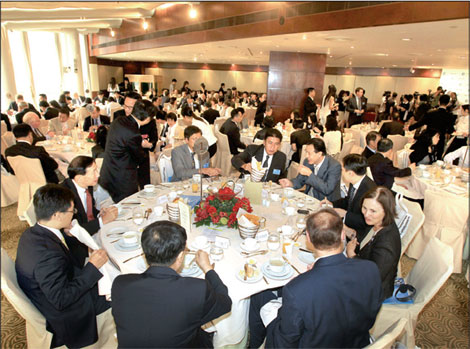Inflation could peak this month: Prof Fan Gang
Updated: 2011-06-03 08:20
By George Ng & Joy Li(HK Edition)
|
|||||||||

China's inflation will very likely peak by the end of this month, Fan Gang, a former senior advisor to the People's Bank of China (PBoC), told China Daily in an exclusive interview on Thursday.
"Previously, we forecast a peak in May or June," said Fan, an economics professor at Peking University and the graduate school of the Chinese Academy of Social Sciences.
While the severe draught that has hit southern China has caused some uncertainties, inflation is still expected to peak by the end of June, he said.
There are several factors supporting this optimistic scenario, said Fan, who is also director of the National Institute of Economic Research, an influential think tank in China.
First of all, the monetary policies implemented over the past eight months have successfully mopped up a big chunk of surplus liquidity, he said.
Meanwhile, the prices of vegetables, which contributed about 40 percent of inflation pressure, are showing signs of stabilizing, he noted.
Furthermore, prices of oil and other commodities are also stabilizing if not declining as Russia and Ukraine have restarted their exports, he added.
Given these factors, the escalation of inflation will "definitely" not extend beyond June of this year, Fan reckoned.
While declining to speculate on the level that inflation will likely peak at, Fan said the general situation this time will be much more benign than that of 2007 and 2008 when the CPI rose to as high as 8.7 percent.
But despite his optimism that inflation is likely to peak this month, the economist declined to draw a conclusion that monetary tightening might ease in the second half. "Monetary polices change along with economic conditions. I don't know if it will ease as there is still uncertainty," he said, referring to the potential impact of the drought on agricultural production.
On worries about further hikes in interest rates in the near term in case inflationary pressure continues to rise, the ex-central bank advisor said "it is always possible".
However, quantitative methods are more likely to be used given the current economic conditions, he added.
"Of course, we don't exclude the use of rate hikes (as a tool). In fact, we have used this tool in the past", Fan said, citing the existence of a negative interest rate, which has helped to drive deposits into asset markets such as the property market, raising concerns about asset price bubbles.
However, the odds seem to favor quantitative tools such as the reserve requirement ratio (RRR), central bank bills and controls on loan liquidity, Fan said.
Based on the statistics of the PBoC's monetary moves in the past six months, quantitative measures were much more frequently used than the interest rate tool, he noted.
The PBoC has raised the RRR 11 times and the interest rate four times over the past several months in its fight against inflation.
Fan said there were several reasons behind the monetary authority's preference to use quantitative tools over interest rate hikes.
First, "If we expect the negative interest rate to be a short term phenomenon and it just fluctuates, there is no need for the monetary authority to frequently adjust the interest rate," he explained.
Another factor being considered in mapping out monetary policies is concerns about an inflow of "hot money", the former PBoC advisor said.
If China raises interest rates too much, there will be a problem: the widening rate gap will put further pressure on the yuan to appreciate, a factor that may encourage an even greater inflow of "hot money", he explained. Furthermore, rate hikes always face stronger objections compared to other monetary tools as a rise in interest rates increases the burden on borrowers, Fan said.
China Daily
(HK Edition 06/03/2011 page4)